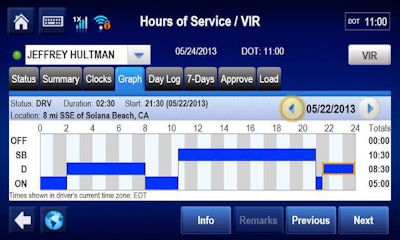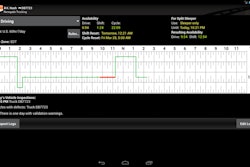 Updates to e-log applications to reflect the sudden changes to HOS regulations are just a small part of the potential rocky rollback of rules governing drivers’ use of a 34-hour restart. Enforcers, too, will be challenged with reverting to enforcing old rules.
Updates to e-log applications to reflect the sudden changes to HOS regulations are just a small part of the potential rocky rollback of rules governing drivers’ use of a 34-hour restart. Enforcers, too, will be challenged with reverting to enforcing old rules.Trucking groups like the American Trucking Associations and the Owner-Operator Independent Drivers Association have pressed hard the last 18 months to see FMCSA’s 2013 changes to hours-of-service rules for truck operators undone, calling them unnecessarily restrictive with no real benefit to safety or trucking operations.
Saturday evening, trucking interests prevailed, as Congress passed a bill that includes a stay of enforcement on two of the key provisions of the 2013 rule — removing the requirement that a driver’s 34-hour restart include two 1 a.m. to 5 a.m. periods and the once-per-week limit of the restart’s use.
ATA was quick to offer praise of Congress’ action, calling it a “common sense fix to two unjustified provisions” of HOS rules.
“We have known since the beginning that the federal government did not properly evaluate the potential impacts of the changes it made in July 2013,” said ATA President and CEO Bill Graves. “Now, thanks to the hard work of Senator Collins and many others, we have a common sense solution. Suspending these restrictions until all the proper research can be done is a reasonable step.”
Likewise, OOIDA offered its support of Congress’ action last week before the bill passed, saying the restart provisions compromise safety by dumping drivers out into the most congested hours of the day.
Trucking research firm FTR Associates last week also chimed in before the bill passed, saying it estimates trucking to see a 2 percent productivity jump after the restart provisions are suspended.
Despite the industry’s excitement over the changes, implementation of the new (old) rules will be a challenge, says Steve Keppler, head of the Commercial Vehicle Safety Alliance.
Carriers and drivers should expect varying enforcement of the rules nationwide, Keppler says, especially in the immediate aftermath of the changes become official.
“People can’t just turn on a dime when something like this takes place,” he says.
State enforcement representatives enforce state law, technically, not federal law. In many states, federal law is adopted automatically. In others, that’s not so. “They have to go through some in-state processes, so we’re likely to see inconsistency and uniformity issues for a while –- that’s got implications for data quality and CSA.”
Electronic logging devices and other e-log applications are also programmed for the 2013 rules. Updates reflecting the legality of the new rules could take a few weeks, says Omnitracs’ Tom Cuthbertson.
Until then, e-log applications may flag drivers for a violation if their restart periods don’t align with the soon-to-be-suspended rules.
Prep to update the software, at least for Omnitracs, is already under way, Cuthbertson says.
“We’ve looked at all our systems that would be affected by this change. We’re taking a very concise review of them [to ensure that with updates to the rule set] we protect the integrity of the last six months’ worth of information” to conform to FMCSA’s record-keeping requirements. “It’s a minimum change,” he said. “It’s a clean change.”












